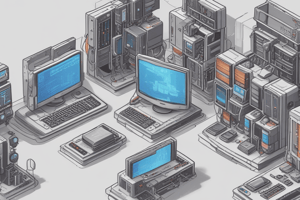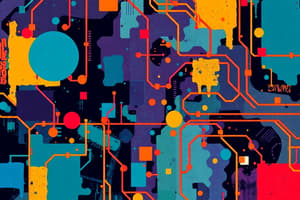Podcast
Questions and Answers
Which characteristic is most critical for hard real-time systems?
Which characteristic is most critical for hard real-time systems?
- Minimizing power consumption.
- Maximizing computational throughput.
- Employing the latest technology for processing.
- Meeting all specified deadlines without failure. (correct)
A real-time system's correctness depends on what two factors?
A real-time system's correctness depends on what two factors?
- The input data and the algorithm complexity.
- The programming language and the hardware used.
- The output values and the time at which the outputs are produced. (correct)
- The system's clock speed and memory capacity.
What differentiates a real-time embedded system from a regular embedded system?
What differentiates a real-time embedded system from a regular embedded system?
- It is smaller in size.
- It has stringent timing constraints. (correct)
- It includes a display screen.
- It uses less power.
What is the primary purpose of the 'Configurability' feature in an embedded OS?
What is the primary purpose of the 'Configurability' feature in an embedded OS?
Why is it advantageous to replace dynamic data with static data in embedded systems?
Why is it advantageous to replace dynamic data with static data in embedded systems?
What is a key characteristic of embedded systems concerning their operational environment, compared to desktop OSs?
What is a key characteristic of embedded systems concerning their operational environment, compared to desktop OSs?
What is the significance of 'temporal dependency' in the context of real-time systems?
What is the significance of 'temporal dependency' in the context of real-time systems?
Which of the following is a critical task managed by embedded operating systems?
Which of the following is a critical task managed by embedded operating systems?
Which of the following is NOT a typical component of an embedded system?
Which of the following is NOT a typical component of an embedded system?
In the context of embedded systems, what does 'hardware/software co-design' refer to?
In the context of embedded systems, what does 'hardware/software co-design' refer to?
Why is it important for an embedded system in a car to react to changes in the environment in real-time?
Why is it important for an embedded system in a car to react to changes in the environment in real-time?
Which of these is a characteristic of embedded systems?
Which of these is a characteristic of embedded systems?
Which of the following systems can be classified as a Soft Real-Time system?
Which of the following systems can be classified as a Soft Real-Time system?
In Real Time systems, why is the 'time' aspect of producing outputs so important?
In Real Time systems, why is the 'time' aspect of producing outputs so important?
What is special about a 'dedicated' software embedded in a computer hardware?
What is special about a 'dedicated' software embedded in a computer hardware?
What is an element of the Controlling System in a car?
What is an element of the Controlling System in a car?
Which of the following is a non-critical task in an embedded system in a car?
Which of the following is a non-critical task in an embedded system in a car?
What main function illustrates the characteristics of an embedded system like a digital camera?
What main function illustrates the characteristics of an embedded system like a digital camera?
What is essential when designing hardware and software together for a digital system?
What is essential when designing hardware and software together for a digital system?
Which of the following is a popular processor used in embedded systems?
Which of the following is a popular processor used in embedded systems?
What is one thing that Embedded OSs need to do well?
What is one thing that Embedded OSs need to do well?
Which operating system is specially made for Mobile devices (smartphones)?
Which operating system is specially made for Mobile devices (smartphones)?
What is an economical driver for real-time embedded systems?
What is an economical driver for real-time embedded systems?
What is required of a Real-Time Embedded System (RTES)?
What is required of a Real-Time Embedded System (RTES)?
What does the term 'radiation-hardened' refer to in the context of RTES requirements?
What does the term 'radiation-hardened' refer to in the context of RTES requirements?
If a Smartwatch collects heart-rate data and displays that data to the user in real-time, what sensors are in play?
If a Smartwatch collects heart-rate data and displays that data to the user in real-time, what sensors are in play?
Which of these answers highlights the ARM Processor.
Which of these answers highlights the ARM Processor.
Assume a robot has a malfunctioning sensor, the robot will likely operate incorrectly. What RTES requirement would prevent such a scenario?
Assume a robot has a malfunctioning sensor, the robot will likely operate incorrectly. What RTES requirement would prevent such a scenario?
What determines if a vehicle is able to avoid collision? Assume that embedded systems manage vehicles actions.
What determines if a vehicle is able to avoid collision? Assume that embedded systems manage vehicles actions.
The term, peripherals, is often mentioned in RTES. What are peripherals?
The term, peripherals, is often mentioned in RTES. What are peripherals?
What is a major task to keep in mind when creating software components for Embedded Systems?
What is a major task to keep in mind when creating software components for Embedded Systems?
From a software perspective, Embedded Systems are designed to:
From a software perspective, Embedded Systems are designed to:
Why can using external hardware (disks, keyboards, screens, or mice) be more expensive in Embedded Systems?
Why can using external hardware (disks, keyboards, screens, or mice) be more expensive in Embedded Systems?
Flashcards
Real-Time Systems
Real-Time Systems
Systems that respond to external events in a timely fashion.
Hard Real-Time Systems
Hard Real-Time Systems
Outputs must be produced within specified deadlines; failure is critical.
Soft Real-Time Systems
Soft Real-Time Systems
Deadlines can be occasionally missed without causing system failure.
Embedded System (ES)
Embedded System (ES)
Signup and view all the flashcards
Real-Time Embedded System (RTES)
Real-Time Embedded System (RTES)
Signup and view all the flashcards
Requirements for RTES
Requirements for RTES
Signup and view all the flashcards
Reactive and Real-Time
Reactive and Real-Time
Signup and view all the flashcards
Hardware/Software Codesign
Hardware/Software Codesign
Signup and view all the flashcards
Configurable OSs
Configurable OSs
Signup and view all the flashcards
Dynamic to Static Data
Dynamic to Static Data
Signup and view all the flashcards
Peripheral Variety (in ES)
Peripheral Variety (in ES)
Signup and view all the flashcards
Protection Mechanisms (in ES)
Protection Mechanisms (in ES)
Signup and view all the flashcards
Software Components (of ES)
Software Components (of ES)
Signup and view all the flashcards
Android (OS)
Android (OS)
Signup and view all the flashcards
Microsoft Windows Systems
Microsoft Windows Systems
Signup and view all the flashcards
Symbian
Symbian
Signup and view all the flashcards
Study Notes
Real-Time (RT) Systems
- Real-time systems respond to external events promptly
- Guaranteed response times
- Timely computation is needed
- Deadlines, jitters, and periodicity need to be considered
- Temporal dependency is a relevant factor
- Significance on when the outputs are produced, within specified bounds or deadlines
- Correctness relies on output values and the time inputs are processed and outputs are produced
- Hard Real-Time systems produce outputs within specified deadlines; failure results in system failure
- Examples include Flight Control, Air Traffic Control, Robots, and Automotive Control Systems
- Soft Real-Time systems deadlines can be occasionally missed
- Examples include communications using timeout protocols, ATMs, Airline Reservation Systems, and Process Control Systems designed to tolerate delays
Embedded Systems (ES)
- Embedded systems feature software embedded in computer hardware, dedicated to specific applications or parts of larger systems
- Specifically purposed software in computer hardware
- Any device with a programmable computer not intended as a general-purpose computer
Embedded Systems
- Embedded systems consist of hardware (processor, memory, I/O, bus) and software (OS, libraries, application, GUI)
- Hardware and software are developed through a design process using toolchains (analysis, compiler, debugging, integration)
- Embedded systems are everywhere
- In 1999, the estimation was 40-50 embedded processors per home
- Involve hardware (chips) and software (programs)
- CPU processors include ARM, PowerPC, Xscale/SA, and 68K
- Memory typically has 256MB or more
- Input/output interfaces use parallel and serial ports
Real-Time Embedded Systems (RTES)
- Relationship between real-time and embedded systems can be visualized as two intersecting circles
Requirements for RTES
- Size, Power (heat), weight, radiation-hardened for environmental considerations
- Responsive and predictable performance (fast)
- Low cost and time-to-market for economic viability
- Safety, faulty-tolerance, and security for consequence management
- Smaller, cheaper, better, and faster
Characteristics of Embedded Systems
- Reactive and real-time systems react to changes in the environment and compute results in real time without delay
- A car employs embedded systems for many tasks
- Driving Gears
- Windows
- Temperature
- Door-lock/ Theft-lock-alarm
- Brakes/ Accelerator
- Air-Bag, Accident/ Emergency
- Critical tasks Steering and breaking
- Non-critical tasks - Turning on a radio
- Consider the cost of fulfilling the mission for an efficient solution
- Reliability of the driver Fault-tolerance needs to be considered
- Illustrate the embedded system characteristics
- Single function repeatedly
- A system always acts as a digital camera
- Tightly constrained.
- Must be low cost
Embedded System Components
- Constraints are met with hardware/software codesign
- The codesign involves simultaneous design
- Hardware components include Processor
- ARM
- Memory
- Peripherals
Software Components (Embedded Operating System)
- Essential features and considerations of real-time
- Highly configurable
- Embedded OSs are tailored to specific hardware/application requirements by adjusting features and removing unnecessary functions
- Typically optimized at the linker level or through advanced compile-time evaluations
- Dynamic data can be replaced with static data
- Reduces memory management overhead and improves efficiency
- Large range of devices
- Requires diverse peripherals efficiently
- Embedded systems operate in a controlled environment with a certain purpose
- This helps lower the need for extensive protection mechanisms
- Embedded OSs consist of specialized software components
- Manages hardware resources, schedules tasks, handles I/O operations, and provides real-time capabilities
Examples of Embedded Operating Systems
- ARM architecture-supported operating systems include Android, Linux, Microsoft Windows System, and Symbian
- Android A Linux-based operating system for mobile devices developed by the Open Handset Alliance and Google
- Linux Started in 1991 by Linus Torvalds; now a full-featured UNIX-like operating system
- Microsoft Windows System
- Embedded systems - Windows CE and Windows XP Embedded.
- Windows CE - Minimalistic systems
- Windows XP Embedded Modularize variant of Microsoft Windows XP Professional.
- Symbian OS is the successor of 32-bit EPOC Platform from Psion
- Symbian owned by
- Ericsson (15.6%)
- Nokia (47.9%)
- Panasonic (10.5%)
- Samsung (4.5%)
- Siemens AG (8.4%)
- Sony Ericsson (13.1%)
- All are manufacturers of mobile phones
Hardware Overview
- ARM Processer is an efficient processor
- Builds on very successful Cortex-M0 processor
- Retaining full instruction set tool compatibility
- Reduce and increasing performance
Studying That Suits You
Use AI to generate personalized quizzes and flashcards to suit your learning preferences.




